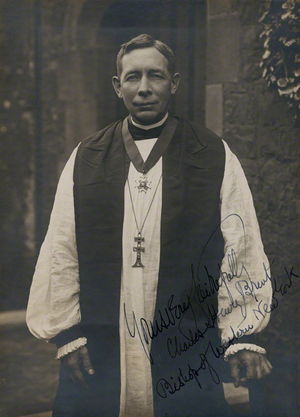Charles Henry Brent
( clergy, missionary) | |
|---|---|
 | |
| Born | April 9, 1862 Ontario, Canada |
| Died | March 27, 1929 (Age 66) Lausanne, Switzerland |
| Nationality | US (Born: Canadian) |
| Religion | Anglican |
Missionary Bishop to the newly annexed Philippine Islands. Chairman of the 1909 meeting of the Shanghai Opium Commission, laying the groundwork for the international ban on opium. | |
Charles Henry Brent was the Episcopal Church's first Missionary Bishop of the Philippine Islands (1902–1918); Chaplain General of the American Expeditionary Forces in World War I (1917–1918); and Bishop of the Episcopal Church's Diocese of Western New York (1918–1929).[1]
Opium
After the annexation of the Philippines by the United States in 1898, Brent was appointed a missionary. He sailed out the same ship with the new Governor General, William Howard Taft whom he had previously met.[2]
Brent pressured President Roosevelt to establish a commission to look at drug use in the Phillipines. In Brent's view, opium was "the greatest evil in Filipino society," so he went all out to stop its use. He served on a three-man commission "to investigate the use of and traffic in opium and the laws regarding such use and traffic in Japan, Formosa, Shanghai, Hong Kong, Saigon, Singapore, Burma, Java, and the Philippine Islands." The commission had its first meeting on August 13, 1903. After months of gathering information and deliberation, the commission presented its recommendations on March 15, 1904. In summary, recommendation was "for opium to become a government monopoly immediately, this to become prohibition, except for medical purposes, after three years." The commission's recommendation was made law by the United States Congress.[3]
Elihu Root made Brent the chairman of the 1909 meeting of the Shanghai Opium Commission. The Assembly of the 13 participating states laid the foundation for the subsequent drug bans at the international opium Conference in The Hague in 1912 and the international ban on opium. The intention was to stop the trade and distribution of intoxicants after the two opium wars.
Chaplain of the American Expeditionary Forces
By the beginning of the first World War, Brent was "a world-renowned figure, a friend of national leaders in many countries, a citizen of the world, a foremost leader in the affairs of his Church."[4] In 1917, he left the Philippines permanently because of ill health.[5] Then he began an even more stressful work in Europe as the Senior Headquarter's Chaplain of the American Expeditionary Forces."[6]
General John J. Pershing was Commander of the American Expeditionary Forces. He knew Brent; he had been baptized and confirmed by him in the Philippines.[7] Pershing invited Brent to be the Chief-of-Chaplains of the American Expeditionary Forces.[8] He worked in this capacity from 1917 to 1918.[9]
During his appointment, Brent was sometimes called "the khaki-colored bishop." He often functioned as "a good-will ambassador" reconciling disagreements between organizations and between nations, especially between Great Britain and the United States. Brent was chosen in 1918 by Pershing to deliver the General's message to the men on the American and British ships stationed in the North Sea. He convinced the French government to take action against the "organized vice which threatened the morality of the army."[10]
References
- ↑ Charles Henry Brent
- ↑ http://justus.anglican.org/resources/bio/116.html
- ↑ Trinity College School Record October 1946-August 1947 (Trinity College School, 1946), 7. Retrieved October 17, 2016.
- ↑ Trinity College School Record October 1946-August 1947 (Trinity College School, 1946), 7.
- ↑ David Shavit, The United States in Asia: A Historical Dictionary (Greenwood Publishing Group, 1990), 57.
- ↑ http://www.internationalbulletin.org/issues/1996-04/1996-04-163-norbeck.pdf
- ↑ George E. DeMille, The Episcopal Church Since 1900: a Brief History (Morehouse-Gorham Company, 1955), 10.
- ↑ Trinity College School Record October 1946-August 1947 (Trinity College School, 1946), 7–8.
- ↑ "Charles Henry Brent, Bishop." Retrieved October 24, 2016.
- ↑ Trinity College School Record October 1946-August 1947 (Trinity College School, 1946), 8. Retrieved October 17, 2016.